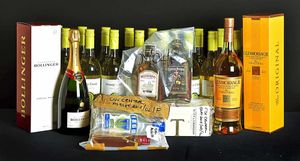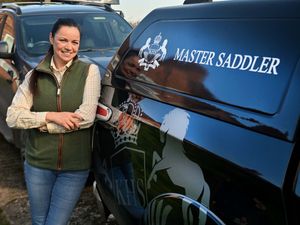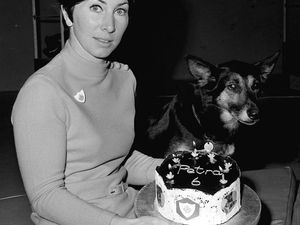Real Life: Cop a load of this lot...
Ever wondered what happens to items confiscated from criminals? Kirsty Bosley finds out...

When a criminal gets busted, do you ever wonder what becomes of the spoils they pocketed?
What do the police do with the swag? And do the convicted take their designer, diamond-studded watch with them when they get banged up?
We always imagined a huge vault somewhere underneath the police station, like a Harry Potter Room of Requirement, stacked to the rafters with all kinds of incredible things, beautiful yet tainted by their unsavoury histories. So we went on a mission to locate all of the lost, stolen and unclaimed items West Midlands Police find in their possession – and we didn't have to go too far to do so.

In the heart of Dudley, in the regal Grade II-listed Baylies Hall, Aston's Auctioneers sell the items on to bargain hunters from all over the country. The auctions take part once every three months, with the proceeds going back into the system.
Ahead of their next auction on Thursday, Chris Aston invited us to have a mooch behind the scenes, checking out the lots before they're sorted. As we enter Aston's off-site warehouse, where separate police stations drop off often huge hauls of unclaimed items, our first reaction is one of surprise.
Before us lay a vast array of bikes of every colour, size and make – some worth hundreds and others more ready for the scrap man.
Other items are dotted around, many in their police evidence bags and some with security tags still attached – swiped straight from shop shelves by thieves that got caught. There are common items such as lipsticks, razors, kids clothes and personal music players. But there were a number of less common bits of swag, including a huge pallet of washing powder, a number of bottles of spirits, one of those machines workmen use to flatten Tarmac and, worryingly, a number of sledgehammers, crow bars and other large, menacing tools.
They were probably pinched from a building site, we assume. But further mooching unearths a metal baseball bat, slightly bent out of shape, and it makes us wonder where these objects had been confiscated from.
Nothing seems to phase 31-year-old auctioneer Chris, who has been expertly valuing and auctioning the police items for five years. It's not just stolen goods that make it through to his warehouse – he's come across more lavish items too.

"As well as the found items and the crime stuff, there's also the proceeds of crime act things that are usually higher value," he explains. "That's where it's been taken off, say, someone that's been selling drugs – maybe it's been taken off them in court or confiscated from their house during a raid. If they're wearing a nice watch in the courtroom, for example, they'll have it taken off them if they haven't had a job for five years and have been found with a load of cocaine and a load of cash. Unless they can give a really good reason as to why they've got a watch like that, it can be reasonably assumed that it's been paid for with the proceeds of crime and taken away from them.
"That money then goes back into a charity for victims of crime. We get mostly Rolexes and Breitling watches through that. They seem to be the items of choice for drug dealers!"
And other criminals aren't so classy. "We had one necklace and it was a huge white gold chain with something crazy like a thousand diamonds encrusted in it, and a huge white cross with diamonds in it too. We sold it for a couple of thousand – stuff like that, blingy jewellery, tends to just make the scrap value. It's so hard to find a buyer that wants something that garish."
We didn't see any of that stuff when we were mooching through the warehouse, though we did happen to come across a box full of luxury Champagne. The buyers, Chris explains, are from all walks of life.
"We have boot sale traders, ebay traders and people that have got shops. But the police auctions tend to attract buyers that don't usually go to auctions and so we have to explain things really carefully, like the 40 per cent you have to pay on top of the hammer price, for VAT and fees. You have to be aware of that if you're bidding."

Seeing precious items such as well- strummed guitars makes us feel a bit sad. Chris tells us many items cannot be reunited with their owners either because they don't know their origins or because they've never been claimed. Other items, such as those from shops, have already been claimed against with insurance companies, so cannot be taken back by businesses.
So now we've seen some of Aston's more obvious items, we're keen to know about the more obscure too.
"The most common thing we get through are bikes. But we have a lot of power tools, clothing, booze, jewellery, electronics and tobacco too. The most interesting lot we've had from the police was a bargain – someone made great money out of it, actually. It was a medical samples case with replacement joints inside – a knee replacement, part of a hip. They hadn't been in someone's body, they were just titanium samples!
"Everyone was in hysterics when I was auctioning it off. 'What are you going to do with these?' We started things off at a fiver, and a couple of guys did bid. Everyone was looking at them like they were weird. We sold them for around £20, but titanium is really valuable. I spoke to the guy that bought it the following month who went and scrapped it in at a metal merchant and got a couple of thousand pounds for it. You've got to look at something unusual like that to get a bargain. If you go for a Rolex watch, everyone in the room knows that they're valuable so you're less likely to get it for a good price."
Chris reminds us, as we eye up a posh make-up set, not to fall into the trap of bidding through excitement. First-time buyers are more likely to bid emotionally at auction, taking out-bids personally and ending up paying more for an item than you'd be able to get it first hand.
Maybe we'll give the make-up a miss, but if we see any titanium body parts, we'll be waving our arms around like overexcited bookies at the races.





